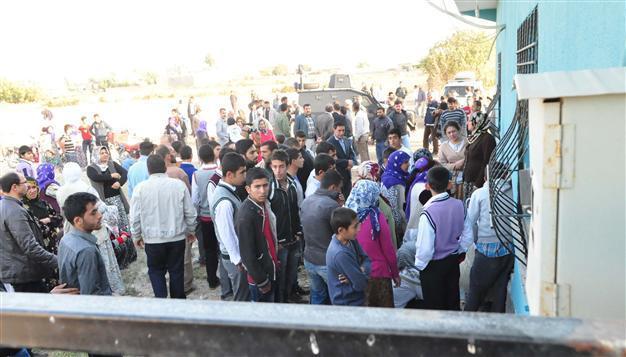Syria civil war claims further lives in Turkey, Lebanon
ŞANLIURFA / DAMASCUS

DHA photo
A 35-year-old man was killed in the southeastern Turkish town of Ceylanpınar early Oct. 28 when a stray mortar shell fired across the border from Syria struck a house near the frontier.The shell was fired during clashes between Kurdish militants and al-Qaeda-linked fighters in the Syrian town of Ras al-Ain. Authorities closed schools in the town and warned locals not to leave their houses after the shell landed.
In October last year a shell fired from Syria hit the Turkish border town of Akçakale, killing five Turkish citizens. In Lebanon, two people died Oct. 28 in the northern city of Tripoli, security and medical sources said, in fighting between supporters and opponents of Syrian President Bashar al-Assad and the Lebanese army.
The dead were from the Sunni district of Bab al-Tabbaneh, where gunmen clashed with the Lebanese army, which is trying to curb the violence from Syria. Twelve people from the area were also wounded, the sources said.
The clashes, which broke out last week and continued over the weekend, have killed 17 people and wounded more than 100.
Meanwhile, U.N.-Arab League envoy Lakhdar Brahimi arrived in Damascus to seek support for a Syria peace conference, as Russia slammed rebels for threatening those planning to attend the so-called Geneva II talks.
Brahimi made his first visit to Syria since last December. At that time, Brahimi called for “real change” in Syria, and for all powers to be handed over to a transitional government.
This time around, Damascus has said the 79-year-old is welcome so long as he stays “impartial”.
In Tehran, Brahimi said it was “necessary” for Iran, a key ally of the Damascus regime, to take part in the Geneva II conference slated for next month and aimed at ending Syria’s two-and-a-half-year conflict.
The initiative’s backers, Washington and Moscow, have struggled to win the support of the warring parties in Syria. In the latest blow, 19 Islamist groups fighting to topple President Bashar al-Assad’s regime issued a statement Oct. 27 saying the Geneva conference “is not, nor will it ever be our people’s choice or our revolution’s demand.” Russia issued Oct. 28 a stinging rebuke to the rebels.
“It is outrageous that some of these extremist, terrorist organizations fighting government forces in Syria are starting to make threats,” Foreign Minister Sergei Lavrov said in televised comments.
“The threats are directed at those who have the courage to attend the proposed Geneva conference being offered by Russia and the United States with the entire world’s support.” The Geneva conference was proposed jointly by Lavrov and U.S. Secretary of State John Kerry in May but has since been repeatedly delayed.
On the battlefront, Syria’s army regained control of the Christian town of Sadad in the central province of Homs after days of fighting against rebels and jihadists, Syria’s state news agency SANA reported.
The Syrian Observatory for Human Rights confirmed the report, adding that anti-government forces had withdrawn to Mahin, scene of fierce fighting for the past week for control of a large, highly strategic arsenal.
Meanwhile, European Commission head Jose Manuel Barroso said the suffering of millions of Syrians caught up in their homeland’s civil war is a “stain” on the world’s conscience.
“The pain and suffering of the Syrian people is beyond what we can tolerate. It is a stain on the world’s conscience,” Barroso told reporters after talks with the International Committee of the Red Cross (ICRC).
His comments came as the European Commission said it would provide 85 million euros ($120 million) in humanitarian aid for people affected by the civil war. The funds are part of a 400-million-euro pledge from Europe following a United Nations appeal made in June, which has proved difficult to finance amid problems with a budget over-run for the 28-nation bloc.

















